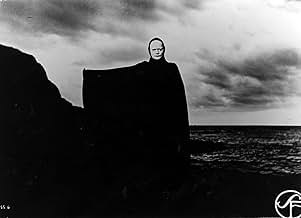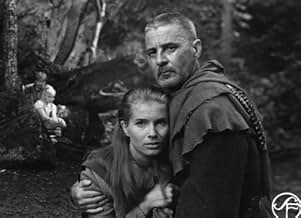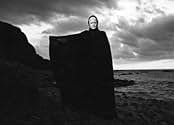Un homme cherche des réponses sur la vie, la mort et l'existence de Dieu en jouant aux échecs contre la Faucheuse pendant la peste noire.Un homme cherche des réponses sur la vie, la mort et l'existence de Dieu en jouant aux échecs contre la Faucheuse pendant la peste noire.Un homme cherche des réponses sur la vie, la mort et l'existence de Dieu en jouant aux échecs contre la Faucheuse pendant la peste noire.
- Réalisation
- Scénario
- Casting principal
- Récompenses
- 9 victoires et 2 nominations au total
Siv Aleros
- Flagellant
- (non crédité)
Sten Ardenstam
- Knight
- (non crédité)
Harry Asklund
- The Landlord
- (non crédité)
Benkt-Åke Benktsson
- Merchant at the Inn
- (non crédité)
Résumé
Reviewers say 'The Seventh Seal' delves into mortality, faith, and existential questions through its medieval setting. The chess game with Death symbolizes humanity's struggle against fate. Themes of societal chaos and religious fervor are depicted through plague, witch burnings, and flagellants. Characters like the knight, squire, and actors provide varied perspectives on life and death, enriching the narrative. The film's allegorical approach resonates with contemporary audiences, highlighting the timeless nature of its themes.
Avis à la une
This classic is filled with a lot of memorable images - from the opening scenes on the seashore to the effective concluding shots, creative thoughts are combined with some fine camera work. There are several significant or interesting questions raised by the characters - from the imagery of the "Seventh Seal" in Revelation, to their simple but important concerns about eternity - but it is the way that the visuals play off of the ideas that make the movie so worthwhile.
The recreation of the medieval world is convincing and effective, with a lot of detail to set off a varied assortment of characters with different personalities and perspectives. The characters are not necessarily very deep, but most are interesting, and are worth caring about. The ways that they deal with their discouraging situation make you wonder what it would have been like to live in their world. It's also a movie that in some respects is even better to watch over again, after you already know what has happened and can then pick up even more of the detail and imagery.
No doubt the somber tone and slow pace will always keep it from being widely popular, and it's not perfect, but it's satisfying in a different way, and deserves its reputation as a classic.
The recreation of the medieval world is convincing and effective, with a lot of detail to set off a varied assortment of characters with different personalities and perspectives. The characters are not necessarily very deep, but most are interesting, and are worth caring about. The ways that they deal with their discouraging situation make you wonder what it would have been like to live in their world. It's also a movie that in some respects is even better to watch over again, after you already know what has happened and can then pick up even more of the detail and imagery.
No doubt the somber tone and slow pace will always keep it from being widely popular, and it's not perfect, but it's satisfying in a different way, and deserves its reputation as a classic.
The mysteries of religion and death have long been a popular focus among artists of all media, including film. And while many films question these mysteries, they seldom provide any real insight into the world of the unknown. In Ingmar Bergman's THE SEVENTH SEAL, these mysteries are not only questioned; they are dissected, splayed, and scrutinized.
THE SEVENTH SEAL could very well serve as sort of a manifesto for existentialism. Its deep acuity and haunting imagery is powerful enough to jar even passive viewers out of their complacency and force them to examine their own reality. The delicately crafted story centers around a 14th century knight named Antonius Block and his ongoing game of chess with a shadowy, hooded figure: Death. Bergman uses this allegory not just to personify death, but to illustrate the lengths man will go to in order to avoid it. In the end, however, Death is a much better player than any of us, and though he may humor some of his opponents by letting them think that they have the advantage, the end result is inevitable: Death always wins. No matter how skillfully we plan our moves or how determined we are to win, we can never beat Death.
In Antonius's search for answers, he encounters a variety of very unique characters, each with their own outlook on life, death, faith, fear and love. Their commentary on such matters is often dryly funny and always brilliant, continuously and effectively challenging our perceptions of the world around us. For me, the dialogue was definitely the high point of the film, as it was extremely thought-provoking and carefully constructed throughout. Almost every line spoken is, in one way or another, daunting and unforgettable. Jöns's description of love as "the blackest of all plagues" is a quote that will forever be engraved in my mind.
THE SEVENTH SEAL truly is a remarkable accomplishment in the world of cinema. It is a deep, mesmerizing, and darkly beautiful work of art. More importantly, THE SEVENTH SEAL is one of those rare movies that doesn't just entertain, but also has the power to change the way one thinks.
THE SEVENTH SEAL could very well serve as sort of a manifesto for existentialism. Its deep acuity and haunting imagery is powerful enough to jar even passive viewers out of their complacency and force them to examine their own reality. The delicately crafted story centers around a 14th century knight named Antonius Block and his ongoing game of chess with a shadowy, hooded figure: Death. Bergman uses this allegory not just to personify death, but to illustrate the lengths man will go to in order to avoid it. In the end, however, Death is a much better player than any of us, and though he may humor some of his opponents by letting them think that they have the advantage, the end result is inevitable: Death always wins. No matter how skillfully we plan our moves or how determined we are to win, we can never beat Death.
In Antonius's search for answers, he encounters a variety of very unique characters, each with their own outlook on life, death, faith, fear and love. Their commentary on such matters is often dryly funny and always brilliant, continuously and effectively challenging our perceptions of the world around us. For me, the dialogue was definitely the high point of the film, as it was extremely thought-provoking and carefully constructed throughout. Almost every line spoken is, in one way or another, daunting and unforgettable. Jöns's description of love as "the blackest of all plagues" is a quote that will forever be engraved in my mind.
THE SEVENTH SEAL truly is a remarkable accomplishment in the world of cinema. It is a deep, mesmerizing, and darkly beautiful work of art. More importantly, THE SEVENTH SEAL is one of those rare movies that doesn't just entertain, but also has the power to change the way one thinks.
THE SEVENTH SEAL is a film that presents a dramatic fantasy game between meaning of life and fear of death. A knight and his squire have returned to their country after a ten-year crusade. Deadly disease ravaged country. Knight faces Death. He calls Death on the multi-day game of chess...
The story has touched serious philosophical and religious topics. However, the story is full of intrigue, dark humor and hope. The protagonists are distracted between the vicious disease, self-pity and torture. It is interesting to see a deeply disillusioned knight, a cynical squire who hates women, a cheating wife, evil priests, a mute girl and seemingly healthy and happy family on the same road. The truth is all around them. The main protagonist used to persistently ask questions to which only he has a valid response. This film reveals some controversial issues. Is deadly disease greater threat to man or the man is the greatest enemy to himself? Mr. Bergman has painted realistic effects of fear, horror, cynicism, surprises, love and health on human faces.
Max von Sydow as Antonius Block, the knight is a more serious version of Don Quixote. Gunnar Björnstrand Jöns, the squire is a character who never changes his mood. He always has some sort of cynical jokes or words of contempt for each occurrence. Bengt Ekerot is Death in the true sense of that word. Nils Poppe as Jof is a juggler who has strange predictions. Fortunately, no one believes him. Bibi Andersson as Mia, Jof's wife is a beautiful and cheerful woman who does not fit into the landscape.
Life is a hard journey. The rare moments of happiness are a sort of salvation. The end of the film emphasizes the transience of life and the power of death which no one can escape. Of course, only in the eyes of one of the protagonists.
The story has touched serious philosophical and religious topics. However, the story is full of intrigue, dark humor and hope. The protagonists are distracted between the vicious disease, self-pity and torture. It is interesting to see a deeply disillusioned knight, a cynical squire who hates women, a cheating wife, evil priests, a mute girl and seemingly healthy and happy family on the same road. The truth is all around them. The main protagonist used to persistently ask questions to which only he has a valid response. This film reveals some controversial issues. Is deadly disease greater threat to man or the man is the greatest enemy to himself? Mr. Bergman has painted realistic effects of fear, horror, cynicism, surprises, love and health on human faces.
Max von Sydow as Antonius Block, the knight is a more serious version of Don Quixote. Gunnar Björnstrand Jöns, the squire is a character who never changes his mood. He always has some sort of cynical jokes or words of contempt for each occurrence. Bengt Ekerot is Death in the true sense of that word. Nils Poppe as Jof is a juggler who has strange predictions. Fortunately, no one believes him. Bibi Andersson as Mia, Jof's wife is a beautiful and cheerful woman who does not fit into the landscape.
Life is a hard journey. The rare moments of happiness are a sort of salvation. The end of the film emphasizes the transience of life and the power of death which no one can escape. Of course, only in the eyes of one of the protagonists.
One of the most extraordinary movies ever made. I cannot recommend 'The Seventh Seal' highly enough.
'The Seventh Seal' is universally regarded as a masterpiece. It's one of those classics like 'Citizen Kane', 'Rear Window' or 'The Godfather' that has subtlety entered popular culture, so even if you haven't actually seen it you recognize references to it in other movies, TV, magazines and everyday conversation. The thing is like the aforementioned and 'Rashomon' and 'Sunset Blvd' it isn't regarded as a masterpiece for nothing, it really is one. I think anybody who loves movies will be totally knocked out by 'The Seventh Seal'. It's still one of the most extraordinary movies ever made. Visually it's stunning, the acting is first rate, and the end result is mesmerizing. Once seen never forgotten is a cliche, but it's the perfect description for this amazing film. Max von Sydow brilliantly plays Antonius Block, a knight returning from the Crusades who challenges Death (Bengt Ekerot) to a chess match. He is accompanied on his journey home by his cynical squire Jons (Gunnar Bjornstrand). Jons is my favourite character in the movie, and as good as von Sydow is Bjornstrand's performance is even better. I also was very taken by the traveling actors who become part of Block's entourage, Jof (Nils Poppe) and his wife Mia (Bibi Andersson), and confess to developing quite a crush on Mia. I cannot recommend 'The Seventh Seal' highly enough. Don't be put off by Bergman's highbrow reputation, this is a movie that can be appreciated by anybody, especially by old school horror fans. While it isn't strictly a horror movie itself anyone who admires the James Whale and Val Lewton classics of the 1930s and 1940s will find much to enjoy here.
One thing that can be certain after watching the Seventh Seal, outside of being thankful for living in this century, is that Bergman knows his film-making- and imagery. He uses subliminal and not so subliminal techniques to convey a dying, frightened world, where making a living is almost impossible and the debate of god's control over life is discussed like un-rhyming yet fascinating poetry.
The result is beautiful cinema, capturing the always foreboding fear and allure of the almighty and for the waiting death, appropriately staged in post-crusades, mid dark age Europe. Max Von Sydow gives an excellent showing as the opponent of Death (in a clever and meticulous chess game), yet the character of Death, played by Bengt Ekerot with chilling conviction, steals the show, if only for the alluring quality of the character.
Even if the story veers it veers in good and interesting territory, focusing on people who convey Bergman's point and or style. I can't reveal what the bottom line point is (many newcomers to Bergman's work won't either, especially if you're not in the mood for soul searching), but one thing is for certain, an allegory on life and death is shown perfectly in the second to last shot of the reaper and his minions following in a dance across the field. This is one of the most pure of cinema's masterpieces and certainly Bergman's best cine. A++
The result is beautiful cinema, capturing the always foreboding fear and allure of the almighty and for the waiting death, appropriately staged in post-crusades, mid dark age Europe. Max Von Sydow gives an excellent showing as the opponent of Death (in a clever and meticulous chess game), yet the character of Death, played by Bengt Ekerot with chilling conviction, steals the show, if only for the alluring quality of the character.
Even if the story veers it veers in good and interesting territory, focusing on people who convey Bergman's point and or style. I can't reveal what the bottom line point is (many newcomers to Bergman's work won't either, especially if you're not in the mood for soul searching), but one thing is for certain, an allegory on life and death is shown perfectly in the second to last shot of the reaper and his minions following in a dance across the field. This is one of the most pure of cinema's masterpieces and certainly Bergman's best cine. A++
Le saviez-vous
- AnecdotesIngmar Bergman credited the film with helping him overcome his crippling fear of death. Because the film dealt so overtly with the subject, he found it a highly cathartic experience.
- GaffesThe chess players focus on capturing the Queen. The Queen was not a super-powerful piece until centuries later when a recent chess-variant initially called "chess of the mad queen" became more popular than the classic game.
- Citations
Antonius Block: We must make an idol of our fear, and call it god.
- ConnexionsEdited into Vikings (2007)
Meilleurs choix
Connectez-vous pour évaluer et suivre la liste de favoris afin de recevoir des recommandations personnalisées
Détails
- Date de sortie
- Pays d’origine
- Langues
- Aussi connu sous le nom de
- El séptimo sello
- Lieux de tournage
- Hovs Hallar - Naturreservat, Skåne län, Suède(Opening beach scene and ending scene)
- Société de production
- Voir plus de crédits d'entreprise sur IMDbPro
Box-office
- Budget
- 150 000 $US (estimé)
- Montant brut mondial
- 312 104 $US
- Durée
- 1h 36min(96 min)
- Couleur
- Rapport de forme
- 1.37 : 1
Contribuer à cette page
Suggérer une modification ou ajouter du contenu manquant



































